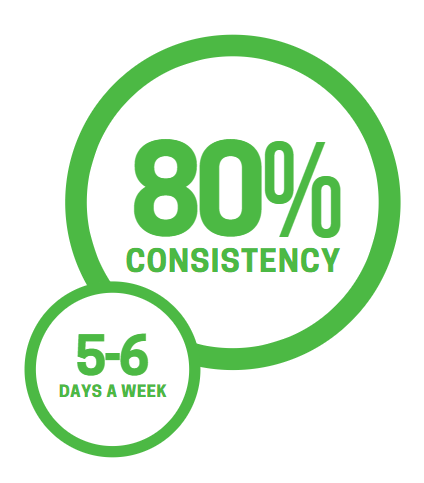Shifting From “All or Nothing” Diets & Nutrition
It’s safe to say that a large majority of people have tried to improve their eating habits and exercise habits at some point in their life. It’s important to remember that improving health should be a long term goal that should work with your life and personal situation, instead of extreme, short term results that flip your life upside down and create an “all or nothing” approach (i.e. 30-day challenges).
It’s common for someone to jump in the deep end of nutrition and fitness and start a plan that may not be tailored to their life, finances, schedule, or preferences. For example, starting a new exercise plan emphasizes “no days off”. Or if someone tries a new, overly restrictive diet that eliminates their favorite foods or staples of their eating for 30 days. These approaches are usually all or nothing, with no perceived middle ground. When the inevitable “off day” happens, feelings of failure and guilt start – which can eventually lead to a negative relationship with nutrition and exercise.
To move away from “all or nothing”, it’s important to look at what your definition of “progress” or “success” is. Patience is important in any lifestyle change, since progress isn’t always linear, and life isn’t the same every day. Losing 50lbs in a year sounds great, but losing 1lb per week for one year doesn’t sound as exciting. For example, someone that is trying to improve food choices and exercise more regularly may have a weight loss goal as their main goal. They might be focused only on weight and get discouraged when weight loss stalls or doesn’t happen immediately. They may ignore other goals, milestones, and benefits from improved eating habits and exercise.
NON-WEIGHT PHYSICAL BENEFITS
IMPROVED BODY COMPOSITION AND MUSCLE MASS, IMPROVED CARDIOVASCULAR HEALTH, LESS PAIN, IMPROVED BLOOD MARKERS, AND IMPROVED DIGESTION.
EMOTIONAL & MENTAL BENEFITS
IMPROVED SLEEP, IMPROVED STRESS BALANCE, IMPROVED RELATIONSHIP WITH FOOD, AND LESS STRESS AROUND MEALS.
It’s safe to say that a large majority of people have tried to improve their eating habits and exercise habits at some point in their life. It’s important to remember that improving health should be a long term goal that should work with your life and personal situation, instead of extreme, short term results that flip your life upside down and create an “all or nothing” approach (i.e. 30-day challenges). It’s common for someone to jump in the deep end of nutrition and fitness and start a plan that may not be tailored to their life, finances, schedule, or preferences. For example, starting a new exercise plan emphasizes “no days off”. Or if someone tries a new, overly restrictive diet that eliminates their favorite foods or staples of their eating for 30 days. These approaches are usually all or nothing, with no perceived middle ground. When the inevitable “off day” happens, feelings of failure and guilt start – which can eventually lead to a negative relationship with nutrition and exercise. To move away from “all or nothing”, it’s important to look at what your definition of “progress” or “success” is. Patience is important in any lifestyle change, since progress isn’t always linear, and life isn’t the same every day. Losing 50lbs in a year sounds great, but losing 1lb per week for one year doesn’t sound as exciting. For example, someone that is trying to improve food choices and exercise more regularly may have a weight loss goal as their main goal. They might be focused only on weight and get discouraged when weight loss stalls or doesn’t happen immediately. They may ignore other goals, milestones, and benefits from improved eating habits and exercise.


Ramon Soto, RD | ramon.soto@hcsgcorp.com
“I love to educate and see others succeed. Working with a long term care population allows me to get to know residents on a more personal level, which makes it so much more rewarding to see positive changes from proper nutrition and education”.
Ramon Soto is a Registered Dietitian and has been with HCSG since 2018. He joined the team after graduating from Cal State Long Beach in 2017 and completing an internship at Cal State Long Beach’s ISPP program in 2018. Outside of work, he enjoys weightlifting, hiking, and cooking.



